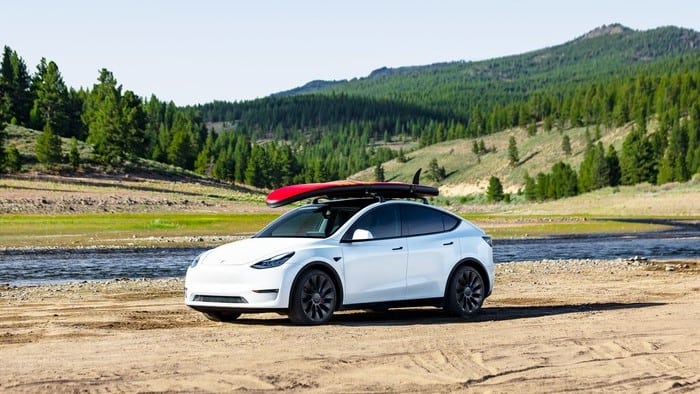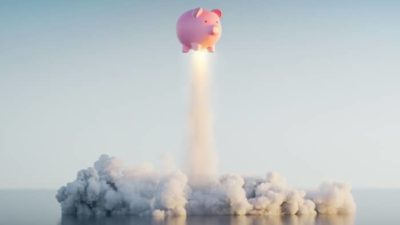This article was originally published on Fool.com. All figures quoted in US dollars unless otherwise stated.
Tesla (NASDAQ: TSLA) has captured the spotlight once again with another showstopper of a quarter. Fans may flock to the company's top and bottom-line growth, the continued success of the Model Y crossover SUV, or its timely rollout of new factories in Germany and Texas. But critics may cringe at Tesla's lofty valuation and CEO Elon Musk's erratic behavior on social media and on other public platforms.
Tesla has been, and continues to be, a battleground stock with a riveting bull and bear case. Here's why the electric car stock may or may not be worth considering now.
A sign of things to come
Howard Smith (Tesla): Tesla shares soared after it just reported results for its 2022 first quarter. While the stock move brings the electric vehicle (EV) leader's already lofty valuation even higher, there are reasons to think it is justified. That valuation is what has kept many investors from buying Tesla stock. At its recent market cap of about $1.1 trillion, the stock has a price-to-earnings (P/E) ratio of 200 based on 2021 earnings. But the most recent quarterly results show why that could still make sense.
Tesla earned $5.5 billion in all of 2021, and it already has booked net income of $3.3 billion in the first quarter of 2022. The company grew revenue 81% in the first quarter compared to the prior-year period. But it's really the bottom line profitability that should catch investors' attention.
Tesla reported an operating margin of 19.2%, which shows just how much it stands out compared to traditional automakers. For perspective, while it hasn't announced first-quarter results yet, General Motors (NYSE: GM) reported an adjusted operating margin of just 11.3% for 2021.
That level of profitability comes in an environment of inflation driving rising raw material costs. Additionally, Tesla has had to overcome the suspension of production at its Shanghai plant due to restrictions implemented to fight the spread of a COVID-19 wave.
Even with that headwind, CEO Elon Musk said the company could still achieve 60% growth in its year-over-year vehicle deliveries. With its new plants near Berlin, Germany and Austin, Texas just beginning production, there looks to be plenty of growth still ahead for Tesla.
The company has shown it can operate efficiently even as other manufacturers struggle with supply chain constraints and rising costs. The results from the first quarter may just be a sign of things to come for Tesla. Investors with a place in their portfolio for higher risk growth stocks could do well to include Tesla there.
Tesla keeps demonstrating it is worth a premium price
Daniel Foelber (Tesla): As Howard mentioned, one of the primary reservations that investors have when deciding whether to buy Tesla stock or not is its valuation. And if we know anything about history, hesitating to buy an excellent company on valuation alone is usually a bad idea. Great companies have a habit of growing into their valuation. That hasn't happened yet with Tesla. But there are signs that Tesla could one day be affordable.
One of the common complaints you'll hear about Tesla is that it can never sell enough cars to be worth $1 trillion, let alone grow to a $2 trillion market cap. But the difference between Tesla and legacy automakers is that it's simply a much better business. As Howard said, Tesla continues to sport a high operating margin relative to the industry. Tesla just began delivering vehicles produced from its new factories in Germany and Texas. With those two capital-intensive mega projects now in the past, the full effect of Tesla's profitability is coming into frame.
Tesla's Q1 2022 operating margin of 19.2% resembles a low overhead tech company more so than an automaker. Tesla's profitability is due in part to doing a lot of things in-house and controlling its sales and distribution, which helps it keep costs down and rely less on external suppliers. And even as the company cited supply chain disruptions and higher raw material costs as challenges for the quarter, Tesla's high average selling price and ability to reduce costs largely offset these headwinds.
Tesla is growing fast and is more profitable than ever, with Q1 2022 revenue up 87% year-over-year (YOY) to $16.86 billion and adjusted diluted non-GAAP earnings per share (EPS) up 246% YOY to $3.22. The run rate for those figures would give Tesla 2022 sales of $67.44 billion and $12.88 in adjusted diluted EPS -- giving it a forward price to sales ratio of 15.9 and a forward price to earnings ratio of 79.2 -- not cheap by any stretch of the imagination.
Tesla is undeniably the best company in the auto industry and could very well accelerate its growth and continue to look like it deserves to be worth a lot more than critiques say it should be. But in terms of being the best stock, I would simply argue that there are better ways to invest in the growth of EVs than solely buying Tesla. If this market has taught us anything, it's that valuation does matter. The risk/reward for Tesla just doesn't seem to be worth it quite yet, especially given some of the amazing growth stocks that are on sale right now.
A compelling success story in a struggling industry
Tesla has always had impressive technology. But over the past few years, it has evolved to become a very well-run and profitable business that continues to earn more revenue, profit, and free cash flow. The biggest advantage that Tesla has over the competition is that nearly 100% of its cash flow gets poured into its core business, while other legacy automakers still have a lot of costs associated with internal combustion engine divisions. Put another way, Tesla can sustain its momentum and outpace the growth of its competition. For that reason, Tesla may be worth considering now for risk-tolerant investors that can stomach volatility. But for everyone else, it's OK to wait too.
This article was originally published on Fool.com. All figures quoted in US dollars unless otherwise stated.









